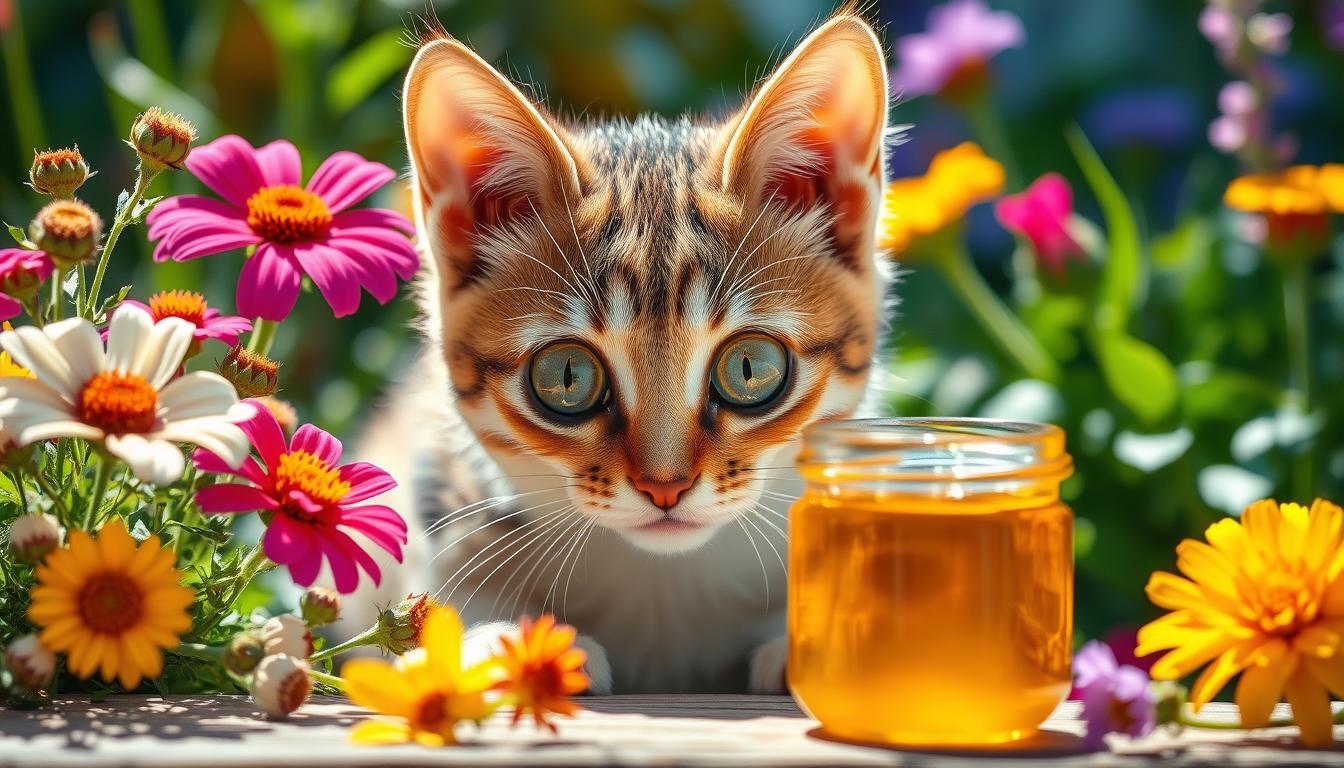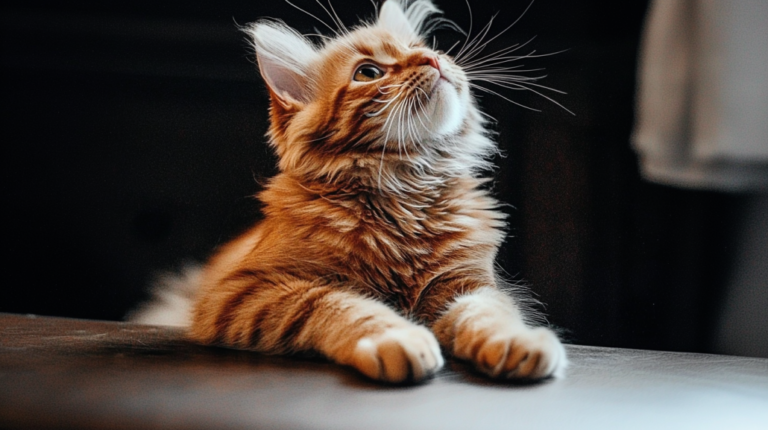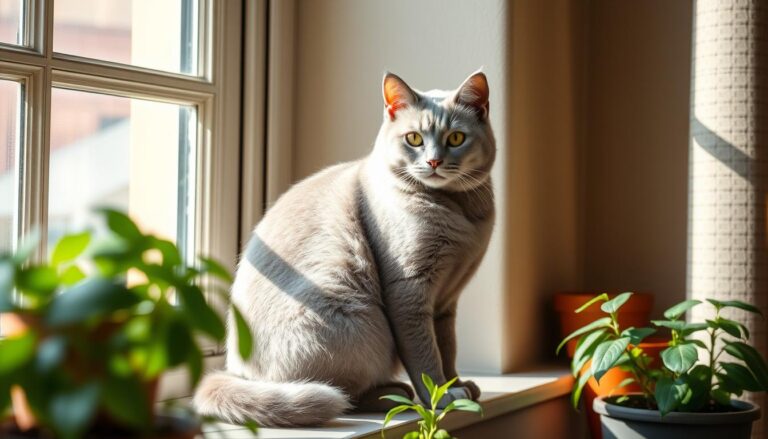Can Cats Eat Honey? Feline Diet Facts
As a lifelong cat parent, I’ve always wondered about honey for my feline friends. Honey seems like a natural treat, but is it safe for them? In this guide, we’ll look at the facts about cats and honey. We’ll explore the benefits and risks to help you decide what’s best for your cat.
When it comes to honey for cats, their digestive system is key. Cats are meant to eat mainly animal proteins. Unlike humans, cats can’t taste sweetness because of their taste receptors.
Table of Contents
Vets Don’t Recommend Feeding Honey to Cats
Honey is tasty for humans, but vets say no to cats. Cats can’t digest honey’s sugar because they lack the right enzymes. This can harm their health and diet.
Cats Lack Digestive Enzymes to Process Sugar
Cats are meat-eaters, not sugar-lovers. Unlike us, they don’t have the enzyme to break down honey’s sugar. This could induce stomach discomfort such as vomiting and diarrhea.
Potential Risks: Gastrointestinal Issues, Weight Gain, and Diabetes
- Gastrointestinal Problems: Honey’s sugar can upset a cat’s stomach, causing vomiting and diarrhea.
- Weight Gain: Honey has lots of calories, which can make cats gain weight and risk obesity.
- Diabetes: Honey’s sugar can also raise the risk of cats getting diabetes, a serious disease.
So, honey is not good for cats. Vets say no to honey and suggest safer treats for cats.
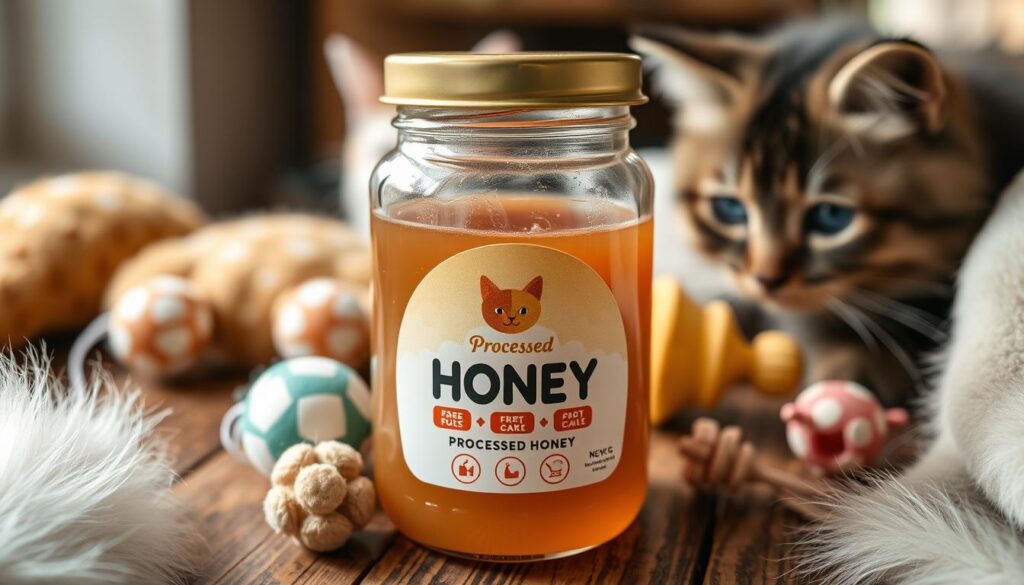
Cats and the Inability to Taste Sweet Flavors
Cats are mainly meat-eaters, needing nutrients found in meat. Their taste sense shows this, as they can’t taste sweet flavors. Their taste receptors are made for protein-rich foods, not sweet ones like honey.
Most feline species can’t taste sweetness. Cats cannot taste sweet because their taste receptors don’t respond to sweet chemicals. They can taste umami in meat, and salty, sour, and bitter flavors.
This special taste ability comes from their diet. As meat-eaters, cats don’t need to taste sweet. This makes them different from many other mammals that eat plants or both plants and animals.
Knowing how cats taste is key to understanding their diet. While humans might want to give them sweet treats, cats don’t enjoy them. Their taste buds aren’t made for sweetness, unlike ours.
Potential Benefits of Raw Manuka Honey
Raw Manuka honey might have some good points for cats, even though honey is not usually good for them. It has antibacterial, antiviral, and antioxidant properties. It’s also used in veterinary medicine for wound management. But, using honey for these things should only be done with a vet’s advice, as it might not be safe for most cats.
Antibacterial, Antiviral, and Antioxidant Properties
Manuka honey is famous for its strong antibacterial powers. It originates from the Manuka plant native to New Zealand. This honey has a special compound called methylglyoxal (MGO) that fights off bacteria well. It also has antioxidants that help fight free radicals and support health.
Veterinary Use for Wound Management
In vet care, Manuka honey is used to treat wounds in animals, including cats. Its antibacterial nature helps stop infections. Its moisturizing properties also help wounds heal. But, using Manuka honey for cat wounds should always be checked by a vet to make sure it’s safe and works well.
| Manuka Honey Benefits | Potential Risks for Cats |
|---|---|
| Antibacterial, antiviral, and antioxidant properties | Digestive issues, weight gain, and diabetes |
| Veterinary use for wound management | Botulism risk from Clostridium botulinum spores |
| Promotes healing and prevents infection | Cats lack the ability to taste sweetness |
Even though Manuka honey might have some benefits, it’s crucial to talk to a vet before giving it to a cat. The risks, like digestive problems, weight gain, and botulism, might be too high for most cats.
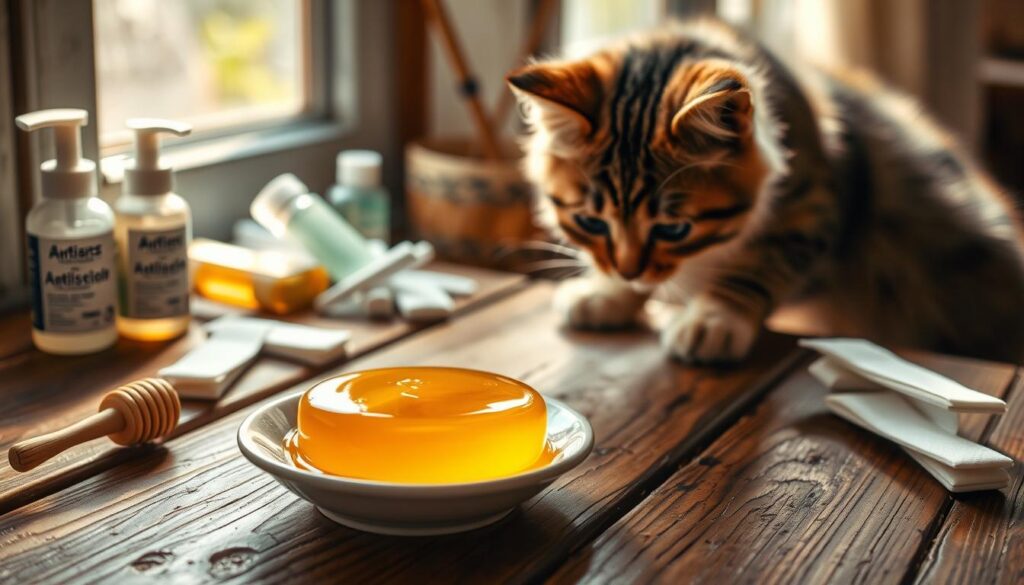
Processed Honey: Empty Calories and Fillers
Honey might look like a tasty treat for cats, but most store-bought honey is not good for them. This honey has lost its good stuff and is filled with added sugars and other things. It doesn’t give your cat any real nutrition.
The way most honey is made takes away the good stuff like enzymes, pollen, and antioxidants. This leaves cats with honey that’s just empty calories. These calories can make cats gain weight, cause stomach problems, and even increase the chance of diabetes.
| Ingredient | Sweetness Compared to Sucrose | Glycemic Index |
|---|---|---|
| Glucose | 0.74 | 100 |
| Fructose | 1.73 | 19 |
| High Fructose Corn Syrup (HFCS) | Sweeter than sucrose | – |
| Erythritol | 0.7 | 0 |
| Xylitol | 1.0 | 13 |
| Saccharin | 300-500 | – |
| Aspartame | 200 | – |
| Sucralose | 600 | 0 |
| Cyclamate | 30 | – |
| Stevia | 150-300 | 0 |
| Monk Fruit Extract | 250-400 | 0 |
If you want to give your cat honey, choose raw Manuka honey or locally made honey. These honeys keep their natural benefits. But, always talk to your vet before adding new foods to your cat’s diet.
can cats eat honey?
As a cat owner, you might want to give your cat a sweet treat now and then. But, it’s wise to be careful with honey. Honey isn’t toxic to cats, but it’s not good for them to eat it often.

Cats can’t digest honey’s high sugar content well. Eating honey can cause stomach problems, weight gain, and even diabetes in cats. Also, cats can’t taste sweetness like humans do, so they don’t enjoy honey as we do.
- Cats lack the necessary enzymes to digest the high sugar content in honey effectively.
- Feeding honey to cats can result in gastrointestinal problems, weight gain, and an increased risk of diabetes.
- Cats are unable to taste sweet flavors, so they don’t find the same pleasure in honey as humans do.
Even a small amount of honey now and then might not hurt your cat. But, it’s better not to make it a regular treat. Instead, give your cat high-protein treats that fit their meat-eating diet better.
“Cats are obligate carnivores, meaning their diet should primarily consist of meat. Honey is not a traditional part of a cat’s diet and is often debated among vegan circles for its animal welfare implications.”
It’s essential to consult with your vet before introducing any new foods to your cat. They can help pick the safest, most fitting treats for your cat’s health and happiness.
Introducing New Foods: Consult Your Veterinarian
Before adding new foods, like honey, to your cat’s diet, talk to your vet. They can tell you which human foods are safe for your cat. They also know how much and how often to give new treats.
Honey might seem good for cats because of its natural sugars and vitamins. But, it’s important to use it carefully. Some cats might be allergic to honey, which can cause itching or breathing problems.
Too much honey can make cats gain weight or even get diabetes. Your vet can check if honey is right for your cat. They will demonstrate safe usage.
Always consult your veterinarian before giving your cat new foods. They’ll make sure it’s safe and right for your cat’s health.
Kittens and the Risk of Botulism from Honey
Honey can be good for adult cats, but it’s dangerous for kittens. It might have Clostridium botulinum spores, which cause botulism. Kittens can’t fight off the toxin well, which can be deadly.
Botulism is a big worry for kittens. It’s key for cat owners to know about honey safety for young cats. Giving honey to kittens can be very risky and even life-threatening.
To keep your kitten safe, don’t give them honey. Use kitten-safe treats and foods instead. This helps their immune system grow strong. Make sure to keep honey away from your kitten.
“Avoid giving honey to kittens due to the presence of Clostridium botulinum spores, which cause botulism.”
If you’re worried about your kitten’s diet or health, talk to your vet. They can help pick the right foods and supplements for your kitten. This keeps them safe and in good shape.
Honey as a Temporary Allergy Aid or Wound Treatment
Some pet owners think about using honey, like raw Manuka honey, for their cat’s allergies or minor wounds. But, the science on this for cats is not strong. Honey has antibacterial, anti-inflammatory, and antioxidant qualities. Yet, its long-term use for allergies or wounds in cats is not proven.
Limited Scientific Evidence for Allergy Relief
There’s not much research on honey for cat allergies. The studies that exist show mixed results. There’s no clear proof that honey works well for cat allergies. Always talk to a vet before trying honey for allergies, as the benefits might not be worth the risks.
Honey’s use as a wound treatment for cats has been studied more. Research has looked at Manuka honey and other honeys for cat wounds. While some studies show promise, the evidence is still limited.
A study with 12 cats and 12 dogs found Manuka honey not as effective as a synthetic dressing. Cats had less skin thickening and scarring than dogs, though.
In summary, honey might help cats in some ways. But, always check with your vet before using it for medical reasons. The science on honey’s safety and effectiveness for cats is still not clear.
Alternative Treats: High-Protein Options
Instead of honey, which is bad for cats, give them healthy cat treats rich in protein. These treats are made to fit a cat’s diet needs. They are a better choice than honey, which is full of sugar.
Great high-protein cat snacks include boiled, plain chicken and cat treats with real meat. These snacks meet a cat’s protein needs. They also make sure your cat is healthy and cheerful.
Before adding new foods to your cat’s diet, seek advice from your veterinarian. This is even more important if your cat has health problems. Choose alternatives to honey for cats that match their nutritional needs.
“The average pet insurance claim for dietary mistakes (overconsumption of inappropriate items) amounts to $572.”
Treats should be less than 10% of your cat’s daily food. Always check the labels and give the right amount of high-protein cat snacks. This way, your cat gets the nutrients they need without the dangers of honey.
WILD ISLANDS CANNED CAT FOOD is a great example. It has 93% meat, giving cats a protein-rich diet like they would eat in the wild. It includes meat and organ meat for a nutrient-rich meal.
You can find this food at pet stores like Pet Lovers Centre, Kohepets, Pet Street, and Polypet. It’s easy to get for cat owners who want a natural, high-protein diet for their pets.
Conclusion
Honey is not bad for cats, but it’s not good to give it to them often. Honey has a lot of sugar, which can upset their stomachs. It can also make them gain weight and increase their chance of getting diabetes.
Cats can’t taste sweetness like we do. So, they don’t enjoy honey like people do.
If you want to add something new to your cat‘s diet, talk to your vet first. They can make sure it’s safe and right for your cat. It’s important to think about your cat‘s health and what they need to eat.
Even though honey isn’t the best choice, you can give it to your cat sometimes. After receiving vet consent. Always put your cat‘s health first and make sure they get the food they need.

